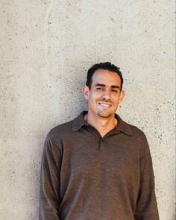John Leverso’s path to a PhD in Sociology is not a typical one: a young man who grew up in Chicago, he was incarcerated from 2001 - 2012. While serving his sentence John earned his GED, and then began taking classes through a local community college with the long-term goal of earning a bachelor’s degree. John wrote his application to the University of Illinois at Chicago on a prison typewriter. Though still behind bars, John excelled in college and forged relationships with several of his professors, including Bill Bielby, who encouraged him to consider graduate school. John applied to the University of Washington while on parole, and chose to join us because of our long tradition of bringing a sociological perspective to criminology.
As a graduate student, the focus of John's research has been the study of the urban street gang, specifically gangs in online settings, gang solidarity, and gang demography and geography. In a recently published paper written with fellow graduate student Yuan Hsiao, John analyzed gang processes on the digital street (Facebook groups) to examine if, when, and how the online environment mimics street corners. This summer John defended his dissertation, "The Evolution of Solidarity and Status Attainment: A Case Study of Chicago’s Latinx Gangs" and moved to Walla Walla with his wife and growing family, where he has begun a job as an Assistant Professorship at Whitman College. John's prior experience as an undergraduate with a nontraditional background has motivated him to excel an educator for all students. Below is a lightly edited interview with John.
Why Sociology? What made it stand out from other disciplines?
In my first semester at UIC (University of Illinois at Chicago), I enrolled in seventeen hours of course work, taking a range of classes on sociological theory, research methods, and statistics, and became interested in studying adolescence, delinquency, and gang involvement with a sociological lens. For example, what social, rather than individual conditions, lead to gang formation and delinquency. My personal experiences left me very interested in how this topic was studied, and I had some great undergraduate advising that really helped hone my research skills. Working with these mentors then lead me towards an academic path as opposed to the being a counselor, and eventually led to me to the PhD program.
What is your teaching approach?
I learn by doing, so I try to incorporate experiential learning into my teaching. I also try to be flexible and meet students where they are at in their lives and learning. My own experience as an undergraduate student with a nontraditional background made me keenly aware of student diversity in learning style, cultural background, and academic experience. I also value independent study and mentorship in guiding students forward in their educational endeavors, at UW I involved 8 undergraduate students in my own research projects where I gave them opportunities to develop their own research ideas and provided guidance as needed.
My time at UW has shaped both my research and teaching in a very positive way. The stats training from CSSS really helped me grow my statistical methods. I also found the training in qualitative methods to be foundational to my research methods. So many faculty and fellow students have helped shape me into a sociologist. Not only my main advisers, but also anyone with a cracked door as I roamed the halls looking for help with the problem of the day.
What are you most proud of in your career to date?
I am most proud of how I was able to turn my life around, albeit with a lot of help. I have lived through trying experiences and had to overcome many obstacles. Education has been key to providing opportunities for me and has opened up the door to which I am able to move forward with my life. I am proud of the hard work it has taken to get to this point, my ability and willingness to take advantage of those opportunities and the dedication it has taken to complete my degrees.
Any tips for sociology PhDs? For undergrads thinking about majoring in Sociology?
For PhD students, don’t get discouraged, academia can involve a lot of rejection. Don’t take it personal and just keep working and learning from each set back. And just keep up with the hard work, it will all pay off in the end.
For undergraduates, take a variety of classes to see what best matches your interests. And don’t be afraid to talk to professors about topics outside of class subject areas, find out what projects they are working on or what they are passionate about. Sometimes you get some really good ideas and book/reading suggestions that way.
What’s next for you?
I am moving to Walla Walla to be an Assistant Professor at Whitman College! I am also interested in getting involved in the community by teaching classes at the local Walla Walla prison. Aside from academics, my wife and I are expecting our second child so spending time with my growing family is another focus for me.
